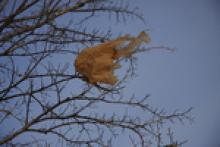For something that has caused so much ecological destruction, locked up so many natural resources into a non-reusable form, and plagued us all with their tendency to be filled by the clerk with either one small apple or six two-liter bottles of soda, it's turning out to be pretty easy to kick the bag habit. Washington D.C. enacted a five cent per bag tax on plastic grocery bags in January, and plastic bag usage has declined by a whopping 50% at minimum.
It's funny how easy it is to change human behavior with economics. The older I get, the more I wish I had gotten an Economics degree in college, because it's obviously the key to how the world works. (English Lit, awesome as it was, clearly has a diminished influence.)
From all people's bitching and moaning about how hard it is to remember to bring tote bags, and "I use those for trash bags," you would have thought the plastic bags would be worth a lot to people. Certainly if you go by the volume of complaints, I would have expected that people would be willing to pay up to at least 20 cents per bag. Although bag taxes are great, and the money raised usually goes to address a local ecological issue, I didn't expect it to start moving the dial at the nickel range.
But no! Turns out? Pretty much any amount of money, no matter how small, is enough to turn people off plastic bags. For a measly nickel per bag, magically people are able to remember to bring in their darned tote bags.
In Washington D.C. plastic bag usage dropped from an estimated 22 million bags PER MONTH to only 3.3 million for the month of January. And that number is sure to fall farther, as more and more people get on the tote bag bandwagon. Eventually, having your groceries loaded into plastic bags will be as cringe-inducing as asking for a Styrofoam cup, or leaded gas. And hurray for that!
What I really find fascinating is that this wee little nickel is such a small token of money. And yet, that is what is real for people: those nickels that add up on their grocery receipts. Whereas in reality, we have all been paying a lot of money for plastic bags all along.
Plastic grocery bags were never free. Their cost was built into your overall grocery bill in a very real way, because the store has to buy them, and they pass that cost along to you the same way they pass along the cost of the lights and refrigerators and employee salaries.
We also paid for plastic bags to be wrangled at the dump. Employee hours are increased by the need to frequently dig stray bags out of the machinery, and that fee gets passed along. Plastic bags clog storm drains and sewers, and we pay city employees to suit up and rip out the clog. Plastic bags dot our landscape, and we pay other city employees to clean them up.
It's funny how easy it is to change human behavior with economics. The older I get, the more I wish I had gotten an Economics degree in college, because it's obviously the key to how the world works. (English Lit, awesome as it was, clearly has a diminished influence.)
From all people's bitching and moaning about how hard it is to remember to bring tote bags, and "I use those for trash bags," you would have thought the plastic bags would be worth a lot to people. Certainly if you go by the volume of complaints, I would have expected that people would be willing to pay up to at least 20 cents per bag. Although bag taxes are great, and the money raised usually goes to address a local ecological issue, I didn't expect it to start moving the dial at the nickel range.
But no! Turns out? Pretty much any amount of money, no matter how small, is enough to turn people off plastic bags. For a measly nickel per bag, magically people are able to remember to bring in their darned tote bags.
In Washington D.C. plastic bag usage dropped from an estimated 22 million bags PER MONTH to only 3.3 million for the month of January. And that number is sure to fall farther, as more and more people get on the tote bag bandwagon. Eventually, having your groceries loaded into plastic bags will be as cringe-inducing as asking for a Styrofoam cup, or leaded gas. And hurray for that!
What I really find fascinating is that this wee little nickel is such a small token of money. And yet, that is what is real for people: those nickels that add up on their grocery receipts. Whereas in reality, we have all been paying a lot of money for plastic bags all along.
Plastic grocery bags were never free. Their cost was built into your overall grocery bill in a very real way, because the store has to buy them, and they pass that cost along to you the same way they pass along the cost of the lights and refrigerators and employee salaries.
We also paid for plastic bags to be wrangled at the dump. Employee hours are increased by the need to frequently dig stray bags out of the machinery, and that fee gets passed along. Plastic bags clog storm drains and sewers, and we pay city employees to suit up and rip out the clog. Plastic bags dot our landscape, and we pay other city employees to clean them up.
And of course, sea life like turtles pay for our plastic bag habit with their lives.
Creative Commons-licensed image courtesy of Flickr user eflon
